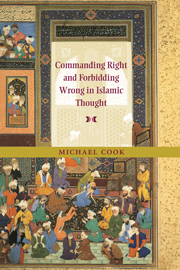Book contents
- Frontmatter
- Contents
- Preface
- Acknowledgements
- PART I INTRODUCTORY
- PART II THE ḤANBALITES
- PART III THE MU'TAZILITES AND SHĪ'ITES
- 9 THE MU'TAZILITES
- 10 THE ZAYDĪS
- 11 THE IMĀMĪS
- PART IV OTHER SECTS AND SCHOOLS
- PART V BEYOND CLASSICAL ISLAM
- APPENDIX 1 Key Koranic verses and traditions
- APPENDIX 2 Barhebraeus on forbidding wrong
- Bibliography
- Postscript
- Index
9 - THE MU'TAZILITES
Published online by Cambridge University Press: 07 December 2009
- Frontmatter
- Contents
- Preface
- Acknowledgements
- PART I INTRODUCTORY
- PART II THE ḤANBALITES
- PART III THE MU'TAZILITES AND SHĪ'ITES
- 9 THE MU'TAZILITES
- 10 THE ZAYDĪS
- 11 THE IMĀMĪS
- PART IV OTHER SECTS AND SCHOOLS
- PART V BEYOND CLASSICAL ISLAM
- APPENDIX 1 Key Koranic verses and traditions
- APPENDIX 2 Barhebraeus on forbidding wrong
- Bibliography
- Postscript
- Index
Summary
INTRODUCTION
If the bias of ḥanbalite thinking was towards the concrete, that of Mu'tazilite thought was towards the abstract. This, in the end, was to carry a certain cost. Whatever may have been the case in the early history of the school, it was becoming clear by the fourth/tenth century that Mu'tazilism could not make a Muslim. Instead it came to function as one element in a package, playing the part of a tradition of abstract scholastic thought that could be combined with a variety of other allegiances. One could be a ḥanafī Mu'tazilite, a Zaydī Mu'tazilite, an Imāmī Mu'tazilite – even a Jewish Mu'tazilite. In these various symbioses, Mu'tazilism tended to represent something between a systematic body of substantive scholastic doctrine and an intellectual technique which, as we have seen, even the ḥanbalites were eventually to find irresistible.
Mu'tazilism thus tended to become a tradition of socially and politically disembodied intellection. One implication of this is that we are unlikely to be very successful in linking the content of classical Mu'tazilite doctrines to the concrete historical environments in which they flourished. I shall accordingly make no attempt to do for Mu'tazilism what I did for ḥanbalism; instead, what lies ahead is the history of ideas in a distinctly narrow sense. There will still be points at which we can link intellectual history to less cerebral realities, but they will be few and far between.
- Type
- Chapter
- Information
- Commanding Right and Forbidding Wrong in Islamic Thought , pp. 195 - 226Publisher: Cambridge University PressPrint publication year: 2001



